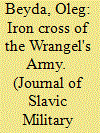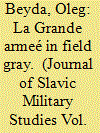| Srl | Item |
| 1 |
ID:
133761


|
|
|
|
|
| Publication |
2014.
|
| Summary/Abstract |
This article is based on little-known sources and unpublished documents and traces the fates of some White Army veterans, who during WWII served in the German Army, holding a rank of sonderführer. Some of them were evacuated to Gallipoli from Crimea in November 1920 (gallipoliytsy). The topic of Nazi administration attitude toward the use of Russian emigrants on the front is also touched upon. Special attention is given to the biographies of Russian emigrant interpreters in the 9th Army of the Wehrmacht. It is concluded that the final aims and motivation of Nazis and White émigrés were different. Realization of that contradiction helps the researcher to understand why a part of Russian military emigration had chosen collaboration and joined Hitler's 'crusade against Bolshevism'.
|
|
|
|
|
|
|
|
|
|
|
|
|
|
|
|
| 2 |
ID:
147815


|
|
|
|
|
| Summary/Abstract |
This article has been compiled on the basis of documents from French, German, and Soviet archives and reconstructs the history of the Legion of French Volunteers Against Bolshevism (LVF) in 1941. Often neglected or scarcely mentioned, the 638th Infantry Regiment was the only formation of the Wehrmacht that took part in the advance on Moscow. Undertrained, poorly equipped, and torn by inside political rivalries, the regiment still marched to the front and fought the Red Army in December 1941. Being almost destroyed, the formation was then withdrawn and thoroughly purged and reshaped by the Germans, who wanted to gain more from the collaboration with the Frenchmen. The experience of 1941 thus constitutes the first — even if unsuccessful — stage of this collaboration, both military and political, that dragged on until 1944.
|
|
|
|
|
|
|
|
|
|
|
|
|
|
|
|
| 3 |
ID:
171685


|
|
|
|
|
| Summary/Abstract |
Although Bulgaria was inducted into the Axis, the country managed craftily to avoid sending military contingents against Soviet Russia. Instead, the Bulgarian army sent multiple groups of officers to the German-Soviet front. An instrumental figure was the Chief of the General Staff, Lieutenant-General Konstantin Lukash, who ‘went East’ in 1941. The Bulgarian officers were received at a high level in two Army Groups, complimented and treated with respect throughout. Nevertheless, they witnessed the horror of the German occupation of the USSR. After 1945, Lukash’s unpublished diary was buried in an archive. This article presents new archival evidence to show that the status of Bulgaria as a complete non-belligerent should be reconsidered to a limited degree.
|
|
|
|
|
|
|
|
|
|
|
|
|
|
|
|